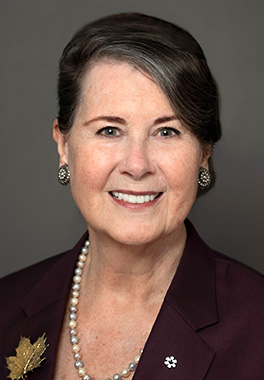
The Honourable Jim Munson
Inquiry--Debate
June 30, 2021
Rose pursuant to notice of June 9, 2021:
That she will call the attention of the Senate to the career of the Honourable Senator Jim Munson.
She said: Honourable senators, I will speak briefly. I want to initiate the debate on the inquiry to allow senators who, due to time constraints, were not able to fete Senator Munson. Please go ahead, anybody who would like to speak. I understand it’s very late.
I’m glad we got to this before I retire.
Thank you, Senator Harder, and thank you for seconding this, Senator Munson.
Honourable senators, it is an honour to speak in tribute to our friend, my Progressive colleague and the “king of kindness,” the Honourable Jim Munson.
Jim has been a welcoming, friendly and compassionate presence in the chamber — always quick with a joke, quick to laugh and quick to care. While he will be missed, the Progressives feel confident we can intermittently lure him out of retirement from his Ottawa home to provide sage advice every now and then. Pints are optional.
Senator Munson leaves behind an impressive legacy. A common theme is that Jim has been a rock for the disability community and, indeed, for defending and advancing all human rights and the principles of inclusion.
In the previous Parliament, Senator Munson sponsored Bill C-81 to create a barrier-free country for Canadians with disabilities. Notably, the House of Commons accepted all Senate amendments — a testament to Senator Munson’s collaborative leadership.
In 2012, after a four-year effort, Senator Munson passed a Senate public bill to establish World Autism Awareness Day in Canada. This bill has brought greater awareness to issues facing the autism community, supporting efforts toward improved public policy and greater inclusion.
Senator Munson was also involved in the groundbreaking 2007 policy report of the Social Affairs Committee, Pay Now or Pay Later: Autism Families in Crisis, which recommended establishing a national autism strategy. Today, as we know, Canada is developing such a strategy, and we recognize Senator Munson’s determined and successful advocacy over the years toward this goal.
Just last month, Senator Munson passed the Kindness Week Act — I think this is the only Senate public bill to become law in this Parliament thus far, or at least it was when I wrote this — passing the House of Commons in two days. We will have to ask Senator Munson his secret, though the theme of that bill may offer a hint.
Finally, I would add that it has been a real joy to be a part of the Progressive Senate Group with Senator Munson. I have benefited greatly from Jim’s experience, collegiality and sense of fun. I am confident that I speak for all members of the Progressive Senate Group when I say we will all try to live up to that spirit going forward.
Create a great summer, everyone. Thank you, hiy kitatamîhin.
Senator Munson, I won’t repeat the facts and descriptions so richly placed on the record by colleagues who have spoken and who clearly hold you in high regard, but I do endorse those positive observations.
I have a confession to make. The first time I heard you speak about Kindness Week, inside my head I scoffed. I was raised a girl in rough-and-tumble rural Manitoba. My sisters and I were proud to be “honorary boys,” and aggressive behaviour was part of our protection. My natural prickly nature flowed well within the competitive culture in student politics, law school and as a lawyer.
When you spoke in honour of Rabbi Reuven Bulka, founder of Kind Canada, naming him as the architect and inspiration for your Senate bill, you quoted his testimony at committee where he said:
My motivation in establishing Kindness Week in Ottawa was to counter the bullying epidemic that had invaded our schools. The logic was simple. Telling children not to do something does not help that much and at times can be counterproductive. But helping children do nice things and say nice things to others creates the type of positive energy that suffocates bullying.
Senator Munson, when you spoke of your work over the years on children’s rights, with the disability community, Special Olympics Canada and families with autism, I heard you say:
Kindness Week can make a positive contribution to inclusion and lead to better experiences for many people and adults alike.
And I paused. I thought of the courtesy and grace you brought to the chair of the Senate Human Rights Committee when I first arrived in the Senate. I thought of how you conducted yourself in this chamber and outside it in less formal encounters. I realized that I was learning from you about increased effectiveness, as a senator who makes kindness their practice.
As you said, kindness has impacted all of us in some way. The impacts can be indirect and sometimes go unnoticed.
You again quoted recently departed Rabbi Bulka from the last time he appeared before a Senate committee, where he said, “There is much research on kindness and its impact that are vital to our appreciating its wide reach.”
I have a long way to go on the kindness continuum, I know. We will all miss you in this place, Senator Munson, but we know we can find you at the Victoria Forum, where undoubtedly they too will learn from you about the power and strategic advantages of kindness, not just for one week of the year but perhaps especially during Canada’s annual Kindness Week.
Senator Munson, exciting new projects and places await you and your wonderful life partner Ginette, and your colleagues here will look forward to welcoming you back for visits.
Senator McCallum has explained to me that in Cree, meegwetch is “thank you,” but chi meegwetch means more: It is a message of thanks, with a connotation of gratitude going forward. Fare thee well, Senator Munson. Chi meegwetch.

